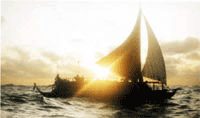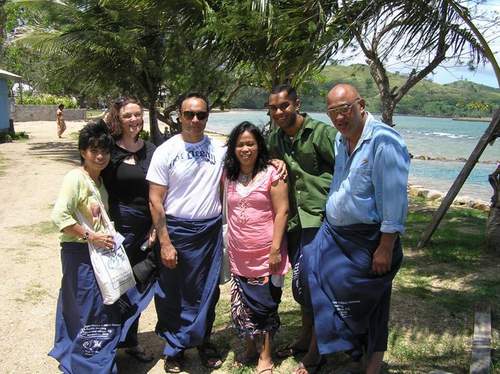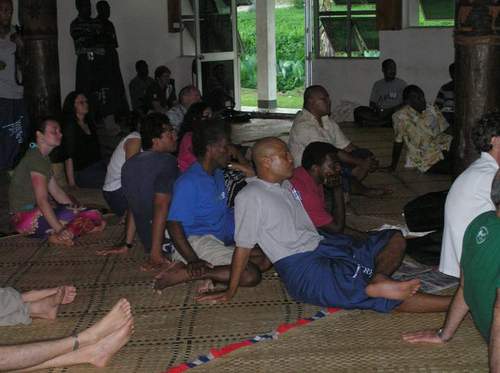

Início
Publicado em 18 de dezembro de 2008
Traduções disponíveis em:
Local Management of Marine Areas (LMMA) Network Meeting, Fiji
por Betsan MARTIN
Temas fortes ligados:
Meio ambiente e responsabilidade .
Temas largos ligados:
Environment .
Maritime environment .
| The Local Management of Marine Areas Network meeting was held in Fiji, November 2008. An invitation to RESPONSE to attend the meeting came through the Across Oceania Symposium held in Samoa in January 2008. Partners from the Philippines and New Zealand attended. The LMMA network reaches from Malaysia and the Philippines across to Tahiti. It is an initiative that combines conservation and biodiversity enhancement with fisheries and the harvesting of other marine resources, such as seaweed. Instead of the more common central government approaches to biodiversity and marine management, these are community initiated forms of local responsibility for marine management, which are influencing local and central government policies. |
Details of the Shared Activity
The LMMA meeting was held over 6 days in Suva, and in village member sites. Participants linked with the Across Oceania network included Hugh Govan (a member of the LMMA Network Co-ordinating team) Kelly May (NIWA), Wayne Ormond (Ministry of Fisheries), Aranui Puna, Guardian (Kaitiaki) of a customary marine reserve (Mataitai). Betsan Martin, Convener of RESPONSE and two participants from the Philippines, Merlyn Martinez and Rosalina Lodripaz. Merly and Rosalina are from OTRADEV, the NGO led by Pinky Cupino.

Overview of LMMA
The concept of Local management of marine areas was initiated through the USAID Biodiversity Conservation Network (BCN) between 1995 and1998. A feature of the initiative was an enterprise approach to conservation, using participatory techniques, which involved 20 projects across the Asia/Pacific region. LMMA’s are managed by local communities in partnership with network support advisors.
The Vision for the LMMA network is:
Healthy ecosystems and communities, abundant marine and fish stocks, and sustainable fisheries.
The following are key areas for LMMA sites:
• Protected marine biodiversity
• Sustainable development in coastal communities
• Understanding of what communities are doing and can do in managing marine areas
• Understanding of ecological and socio-economic responses to LMMA and coastal management implementation.
Areas of key interest with respect to Partnerships for Development and the RESPONSE network
Overall, the LMMA meeting was a most valuable opportunity for in-depth learning as representatives from all participant countries gave presentations on their site programmes and on issues for attention. The meeting provided a shared learning process as well as engagement with network issues as a whole.
The Filipino participants from OTRADEV, who are also RESPONSE partners, were able to meet and work with the LMMA group from the Philippines, and establish a basis for ongoing collaboration in the Philippines. The OTRADEV group wish to pursue LMMA membership, and the meeting in Fiji provided the perfect opportunity for OTRADEV to plan for the development of further sites in association with the Philippines network.
A further aspect of the Filipino–NZ links is the Solidarity Economy network for initiatives, which works for sustainability through ethical investment combined with ethical enterprise. The unique aspect of LMMA’s is the combination of conservation and livelihood enterprises, which are closely aligned with Solidarity Economy interests.
The RESPONSE/NIWA group brought particular NZ experience to the network meeting by being able to share the experience of a Research Institute in partnership with a community initiative. Of particular interest was a methodology being developed for working with science and indigenous knowledge in the management of coastal marine sites.
There are several aspects of shared interest between the LMMA and NZ experience:
• Conservation in NZ is largely managed through a model of protected reserves which are set aside from resource use both on land and sea, with marine reserves being characterized as ‘no-take’ areas. This is possible in a context of government ownership of conservation and marine zones. In contrast, in most Pacific Island countries land and sea ownership remains in customary titles, so any conservation initiatives have to be developed in agreement with customary owners, and includes both land and marine areas.
• The area of Customary Fisheries Management is still in the process of development in New Zealand. The combination of biodiversity enhancement and conservation of marine resources, with sustainable resource use for livelihood interests and non-commercial purposes is an area for fruitful exchange between Maori and Pacific initiatives in the LMMA framework.
• Maori customary marine management is working with traditional marine management systems as contemporary management tools. For example, rahui, a temporary ban on fishing, is a management tool widely used in the Pacific, as a traditional form of adaptive management.
• The LMMA programme combines marine conservation interests with sustainable use of fish and sea products for livelihoods.
• Some LMMA sites include land and sea areas in the managed area – i.e. in Pohnpei 30% of coastal resources and 20% of terrestrial resources are protected.
Outcomes
At the concluding session of the meeting, a presentation was made from the International Union for the Conservation of Nature (IUCN). This identified the development of an Oceania Strategy as a current priority. The LMMA network will contribute to the development of the Oceania framework. A discussion took place between leaders of the LMMA initiative, and RESPONSE and NIWA research partners. Discussions will be held about New Zealand hosting a Pacific wide hui on indigenous knowledge and customary fisheries.



